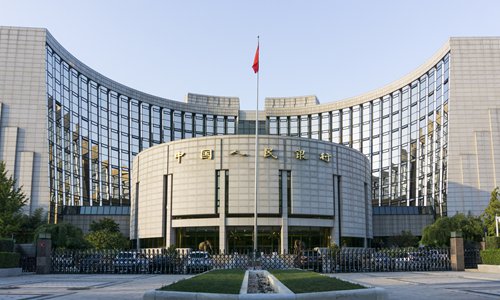HOME >> SOURCE
Financial experts call for China to cut rates in line with Fed
By Xie Jun Source:Global Times Published: 2020/3/16 17:06:38

Headquarters of the People's Bank of China, China's central bank, in Beijing in October 2018 Photo: IC
Financial experts in China have called for China's central bank to reduce its benchmark deposit interest rates "as soon as possible" after the US Federal Reserve's surprising 100-basis-point rate cut overnight, as China's economic downturn - worsened by the coronavirus - raises demands for stronger policy stimulus.
On Sunday, the US central bank cut its benchmark interest rate by a full percentage point to nearly zero. It was its second slash this month since cutting interest rates by 50 basis points on March 3.
A number of central banks around the world including those of Norway and Canada have followed suit with similar massive rate cuts. China's central bank has not yet done so.
Zhao Qingming, a veteran financial expert who previously worked at the People's Bank of China (PBC), said that considering the grave downturn economic pressure that China is facing, the PBC should consider using monetary tools in a bolder fashion, including cutting the loan prime rate and benchmark deposit rate.
"Without stronger stimulus, China's first-quarter GDP is very likely to see negative growth in the first quarter," he said.
China's economic data for January and February signaled losses in multiple sectors. The use of foreign capital was down 8.6 percent, while foreign trade slumped 11 percent year-on-year.
"The current strength of monetary policy stimulus is far from being enough," Zhao said, suggesting the PBC cut its benchmark interest rates by no less than 25 basis points "as soon as possible."
Yang Delong, chief economist at the Shenzhen-based First Seafront Fund Management Co, told the Global Times that the US Fed's rate cut has provided room for China to reduce interest rates, as a widening interest rate spread between the greenback and the yuan has erased possibilities of capital outflow and the yuan's depreciation.
Since August 2019, the PBC has repeatedly guided down the new benchmark lending rate LPR by cutting the interest rates on the Medium-term Lending Facility (MLF). But in general, China has been very restrained in adjusting interest rates. The PBC kept the MLF rate unchanged on Monday, contrary to the expectations of many analysts.
The situation also increases uncertainties about whether monetary stimulus would play a greater role in boosting China's economic growth given the coronavirus assault.
Yang Delong said that it is very likely that the PBC will cut interest rates soon, as both the A-share and global stock markets are under rising pressure.
Chinese mainland shares dived on Monday. The flagship Shanghai Composite Index plunged 3.4 percent, while the Shenzhen Component Index plunged 5.34 percent. The tech-heavy ChiNext index fell 5.9 percent.
But Yang Zirong, an associate research fellow at the Chinese Academy of Social Sciences, said he will vote against rate cuts.
"China's monetary policy is becoming increasingly independent. China's major problem is the obstacles of capital flowing to real industries. I don't think cutting interest rates is the best option," he told the Global Times.
But he predicted that the PBC might be forced to cut interest rates to ease the yuan's appreciation if the coronavirus spread force more central banks to join the "rate cut" league.
Posted in: ECONOMY,BIZ FOCUS